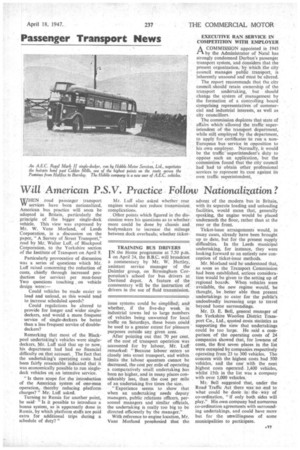Will American P.S.V. Practice Follow Nationalization?
Page 55

If you've noticed an error in this article please click here to report it so we can fix it.
WHEN road passenger transport W services have been nationalized, American bus practice will soon be adopted in Britain. particularly the principle of the bigger single-deck vehicle. This view was expressed by Mr. W. Vane Morland, of Leeds Corporation, in a discussion on the paper, "A Survey of Street Transport," read by Mr. Walter Lull, of Blackpool Corporation, to the Yorkshire section of the Institute of Transport on April 9.
Particularly provocative of discussion was a series of questions which Mr. Luff raised concerning the reduction of costs, chiefly through increased production (or service) per man-hour Two questions touching , on vehicle design were:—
Could vehicles be made easier to load and unload, as this would tend to increase scheduled speeds?
Could regulations be altered to provide for longer and wider singledeckers, and would a more frequent service of single-deckers be better than a less frequent service of doubledeckers?
Remarking that most of the Blackpool undertaking's vehicles were singledeckers, Mr. Luff said that up to now, his department had had no financial difficulty on that account.. The fact that the undertaking's operating costs had been fairly reasonable indicated that it was economically possible to run singledeck vehicles on an intensive service.
"Is there scope for the introduction of the American system of one-man operation, thereby reducing platform charges?" Mr. Luff asked.
Turning to Russia for another point, he said " Is it possible to introduce a bonus system, as is apparently done in Russia, by which platform staffs are paid extra for additional trips during a schedule of duty?" Mr. Luff also asked whether rear engines would not reduce transmission complications.
Other points which figured in the discussion were his questions as to whether_ more could be done by chassis and bodymakers to increase the Mileage between dock overhauls; whether ticket issue systems could be simplified; and whether, if the five-day week in industrial towns led to large numbers of vehicles being unwanted for local traffic on Saturdays, these buses could be used to a greater extent for pleasure purposes outside any given area.
After pointing out that 70 per cent. of the cost of transport operation was accounted for by labour, Mr. Lull remarked: "Because labour enters so closely into street transport, and within limits the labour quantum cannot be decreased, the cost per mile of operating a comparatively small undertaking has been no higher, and in many places considerably less, than the cost per mile of an undertaking five times the size.
"Experience seems to show that when an undertaking needs deputy managers, public relations officers, personnel managers and similar officials, the undertaking is really too big to be directed efficiently by the manager."
With reference to engine location, Mr. Vane Morland prophesied that the advent of the modern bus in Britain, with its separate loading and unloading facilities, would mean that, generally speaking, the engine would be placed underneath the floor, rather than at the rear or the front.
Ticket-issue arrangements would, in many cases, already have been brought up to date, but for the present supply difficulties. In the Leeds municipal undertaking, for instance, they were looking forward to an entirely new conception of ticket-issue methods.
Mr. Morland said he understood that, as soon as •the Transport Commission had been established, serious consideration would be given to the setting up of regional boards. When vehicles were available, the new regime would, he thought, be better able than present undertakings to cater for the public's undoubtedly increasing urge to travel beyond home surroundings.
Mr. D. E. Bell, general manager of the Yorkshire Woollen District Transport Co., Ltd., quoted costs statistics as supporting the view that undertakings could be too large. He said a comparison, of the operating costs of 24 companies showed that, for lowness of costs, the first seven places in the list were occupied by companies respectively operating from 23 to 300 vehicles. The concern with the highest costs had 500 vehicles, and the one with the next highest costs operated 1,400 vehicles, whilst 15th in the list was a company with over 1,000 vehicles.
Mr. Bell suggested that, under the Road Traffic Act there was no end to what could be done in: the way of co-ordination, "if only both sides will play." His own company had numerous co-ordination agreements with surrounding undertakings, and could have more but for the unwillingness of some municipalities to participate.




















































































